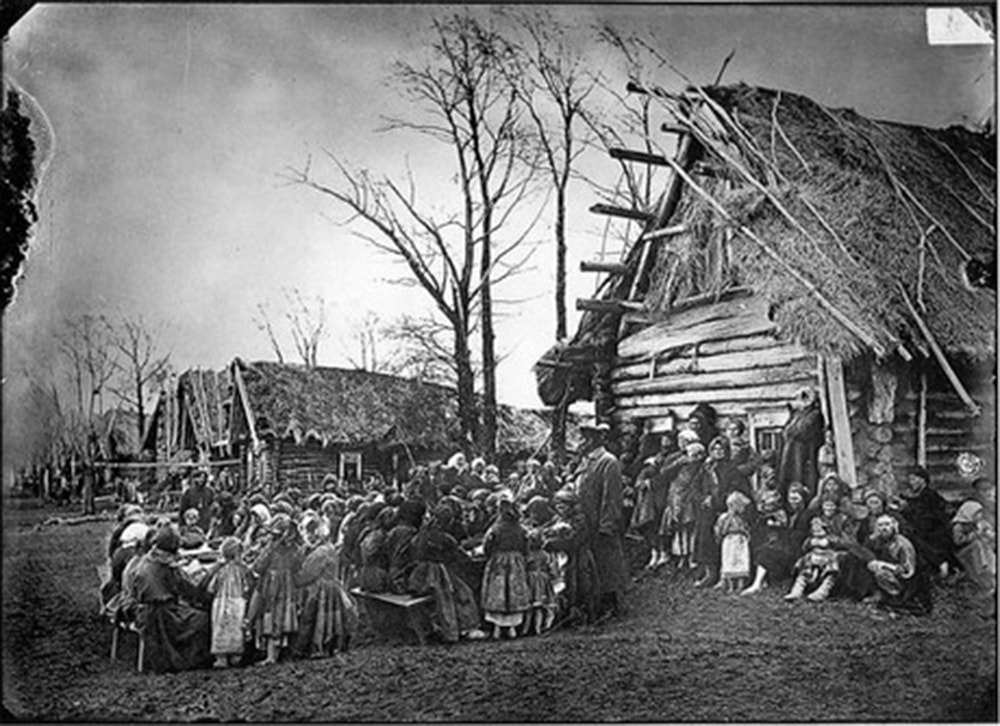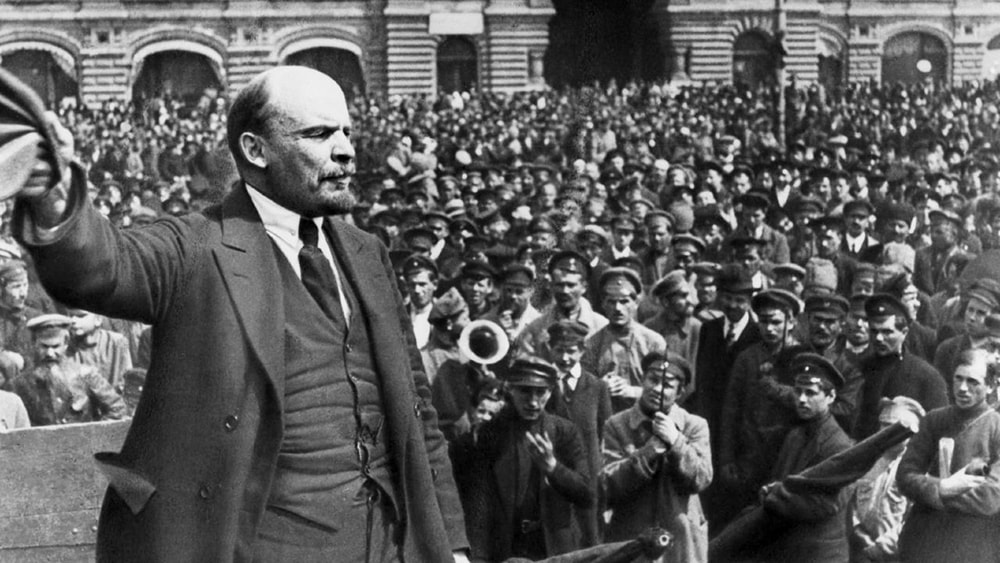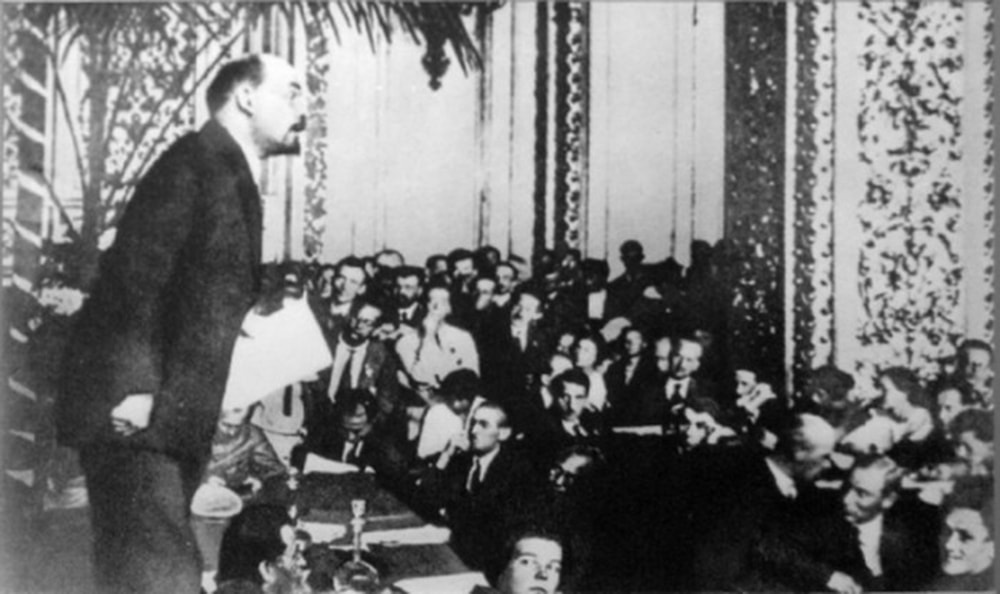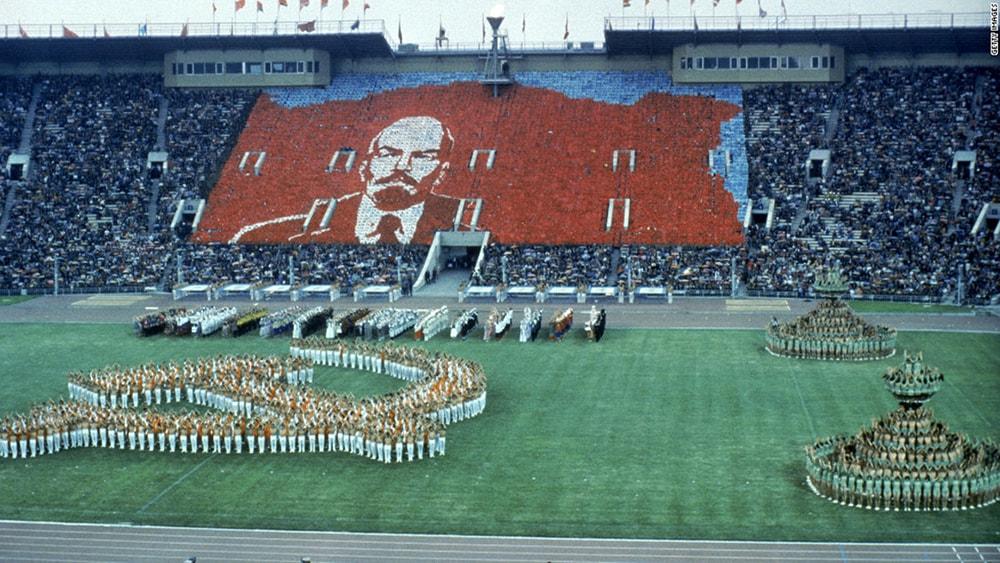'VI Lenin - the creator of new life'
(Baonghean) - Under the Tsarist regime, the working people in Russia had an extremely miserable life. In the article "To the Poor Peasants" written in 1903, VI Lenin (1870 -1924) affirmed: "The only way to relieve the working people of their misery is to change from bottom to top the current regime throughout the country and establish a socialist regime."
A Russia of the Dark Ages
In the early 20th century, Russia entered the imperialist stage but still had many remnants of feudalism.
In agriculture, 30,000 landlords owned 70 million deciliters (1 deciliter = 1.09 ha) and the Tsar himself and his family and relatives owned 7 million deciliters. Meanwhile, Russian peasants made up 4/5 of the population, but 65% of rural households were poor farmers, without land. They were heavily and brutally exploited by the Tsar and the landlords.
 |
| Images of the famine years in Nizhny Novgorod, Tsarist Russia, 1891-1892. In the photo is a communal meal of the villagers of Pralevke in Lukoyanovskoye County. Historical photo |
In terms of industry, in 1914, Russia's total industrial output ranked 5th in the world, after the United States, Britain, France and Germany, but accounted for only 4% of the world's total industrial output. Almost all of Russia's major industries were in the hands of foreign capital. Workers in Russia accounted for 10% of the population but were heavily exploited by employers, so life was very difficult.
Lenin commented on the situation in Russia as “on the one hand the most backward land ownership system and the most ignorant rural conditions and on the other hand the most advanced industrial and financial capitalism”. VI Lenin recognized the worker-peasant alliance as the core force for the revolution. He commented: “The social content of the revolution that is about to break out in Russia can only be the revolutionary democratic dictatorship of the proletariat and the peasantry. The revolution cannot be victorious in Russia without overthrowing the monarchy and the feudal landlords. But the proletariat cannot overthrow them without the help of the peasantry”.
Opening a new era in world history
On April 4, 1917, before the Central Committee of the Russian Social Democratic Workers' Party meeting in Petrograd, VI Lenin read "The Tasks of the Proletariat in the Present Revolution". In it, he emphasized the need to solve the problem of land for peasants and bread for the poor.
On November 7, 1917, the October Revolution in Russia was victorious. On November 8, 1917, VI Lenin was elected by the Russian Soviet Congress as Chairman of the Council of People's Commissars of the Russian Soviet. He emphasized: "We are proud to have had the honor of starting the construction of the Soviet State and thus opening a new era in world history, the era of the rule of a new class, the oppressed class in all capitalist countries and everywhere moving towards a new life, towards the victory over the bourgeoisie, towards the establishment of the dictatorship of the proletariat, towards the liberation of humanity from the yoke of capitalism, from imperialist wars". On January 10, 1918, the Third All-Russian Congress of Soviets adopted the "Declaration of the Rights of the Working and Exploited People", affirming that Russia is a Soviet country with the goal of abolishing the regime of man exploiting man, abolishing classes.
 |
| VI Lenin was the leader who helped Soviet Russia and the Soviet Union develop dramatically from backward Tsarist Russia. Photo: historical document |
To realize the above declarations, VI Lenin and the Russian Bolsheviks immediately took measures. Regarding agriculture. From the spring of 1918, the "Land Decree" began to be implemented to satisfy the long-standing aspirations of the Russian peasants. The peasants received (without payment) more than 150 million hectares of land from the Tsarist family and the landlord class, and 3 billion rubles of bank debts were forgiven. In June 1918, the Soviet government established the Poor Peasants' Committees in the countryside. These committees confiscated and handed over 50 million hectares of land to the poor peasants.
Regarding industry, on November 14, 1917, VI Lenin signed the "Charter on Workers' Control". Accordingly, workers were given the right to control the entire production process in all areas from industry, agriculture, commerce to transportation, transport, and enterprises and cooperatives. On June 28, 1918, the Decree on nationalization of all large-scale industry was issued by VI Lenin. By early September 1918, more than 3,000 industrial enterprises had been nationalized.
To improve the lives of the working people, VI Lenin believed that it was necessary to: “Improve the educational and cultural level of the masses”, “Improve the discipline of the workers, their working skills, their ingenuity”. In the “Great Initiative” written in 1919, VI Lenin stated: “Workers must voluntarily and consciously unite with each other and use modern technology” to create higher labor productivity. In addition, VI Lenin also emphasized competition in labor and production.
In March 1919, in Moscow, VI Lenin met with socialist revolutionaries from all over the world and founded the Communist International. According to VI Lenin, this was necessary to protect the socialist regime in Soviet Russia internationally, so that the Soviet State would become a model and inspiration for the world revolutionary movement, first of all the international communist and workers' movement in the West and the national liberation movement in the East.
 |
| Lenin speaking at the 3rd Congress of the Communist International in 1921. Historical photo |
In 1920, under the approval of VI Lenin, Soviet Russia was the first country to allow people to have a day off on International Labor Day, May 1. Soviet Russia also regulated the working hours to be 8 hours per day as well as many other social benefits for the working people.
The 9th Congress of the Russian Communist Party (Bolsheviks) on March 29, 1920 proposed a plan to restore the national economy. To quickly restore the economy after the civil war and the intervention of 14 capitalist countries, VI Lenin proposed the New Economic Policy (NEP) to replace the "War Communist Policy". In agriculture, the state replaced the requisition of food with the payment of food tax. After paying the tax, farmers had full rights to bring surplus food to exchange on the market. In industry, small enterprises that had been previously confiscated by the state were returned to their former owners. Domestic and foreign capitalists were allowed to open factories and enterprises. In commerce, private individuals were free to trade, exchange, etc.
The New Economic Policy (NEP) quickly achieved positive results. In 1921, the first grain tax reached 90%. From 1922, urban areas had enough food. Labor productivity increased by 33% since September 1925. The lives of farmers and workers improved. Through the distribution of national income in the years 1925 - 1926, it shows that 82% of national income belonged to workers and farmers.
On December 30, 1922, the Union of Soviet Socialist Republics was established. The Congress elected VI Lenin as Chairman of the Council of People's Commissars of the Soviet Union. This was a great victory from VI Lenin's nationalist policy.
 |
| The 1980 Moscow Summer Olympics showed the world the peaceful and developed image of the Soviet Union. Historical photo |
“Lenin is the creator of new life”
President Ho Chi Minh affirmed: “The genius successor of the great work of Marx and Engels in new historical conditions is V. Lenin”. He also affirmed: “In the eyes of colonial peoples, in the history of the suffering and disenfranchised lives of colonial peoples, Lenin is the creator of a new life, the beacon guiding the path to liberation for all oppressed humanity”.
Regarding the path of economic development, President Ho Chi Minh emphasized: “The experience of the October Revolution is the guiding star for us in the cause of building a happy life for the Vietnamese people”. In the light of the October Revolution outlined by VI Lenin, President Ho Chi Minh stated: “In short, in a simple way, socialism is first and foremost to help the working people escape poverty, to give everyone jobs, to be well-off and to live a happy life”. That is the socialist society that our people are building: a rich people, a strong country, democracy, fairness, and civilization.
After more than 30 years of renovation (1986 - 2020), Vietnam has achieved important achievements in the industrialization and modernization of the country. From a backward agricultural economy with 90% of the population working in agriculture, Vietnam has built a material - technical base, economic - social infrastructure to gradually meet the needs of industrialization and modernization, creating an environment to attract social resources for development.
____________________
References:
- VI Lenin, Complete Works, Progress Publishing House, Moscow, 1978.
- Ho Chi Minh: Complete Works, National Political Publishing House, Hanoi, 2000
